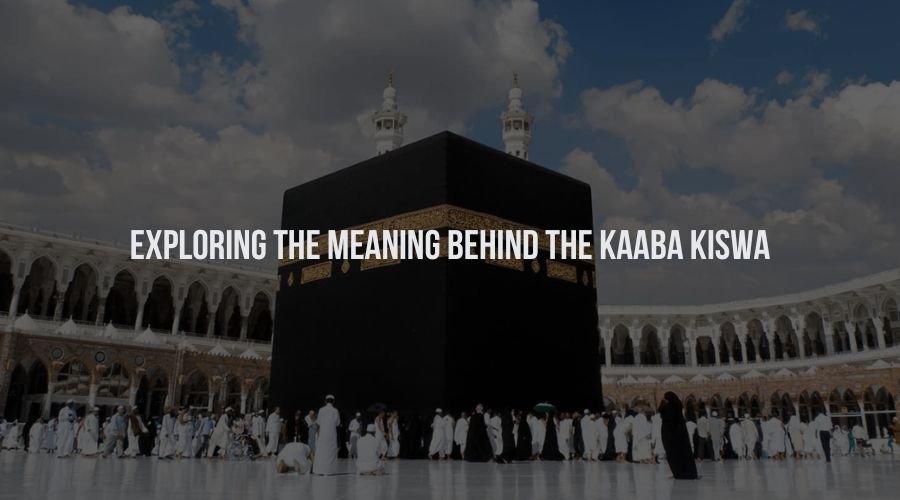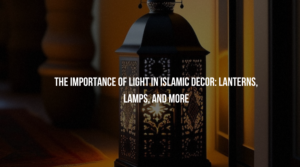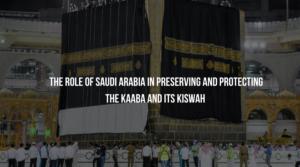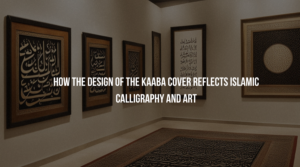The Kaaba, a sacred structure located in the heart of the Grand Mosque in Mecca, stands as a symbol of unity, reverence, and devotion for Muslims around the world. Wrapped around the Kaaba is a cloth known as the Kiswa, which holds profound significance in Islamic tradition. In this blog, we get into the rich history and symbolism behind the Kaaba Kiswa, exploring its religious, cultural, and spiritual meanings.
Historical Appearance
The tradition of covering the Kaaba with a cloth dates back centuries, rooted in the early history of Islam. The Prophet Muhammad himself is said to have initiated this practice during the early years of Islam. Initially, the Kaaba was covered with simple fabrics made from woven materials. However, over time, the tradition evolved, leading to the creation of the ornate and intricately designed Kiswa we see today.
Materials and Construction
The Kiswa is traditionally made from black silk, symbolizing simplicity, humility, and the universality of Islam. The choice of black also represents the absence of worldly distractions and the focus on spirituality. The fabric is often adorned with verses from the Quran, embroidered in gold thread, adding a layer of sacredness to the cloth.
The construction of the Kaaba Cover is an intricate process that involves skilled artisans and craftsmen. It is typically replaced once a year during the Hajj season, following an elaborate ceremony held in Mecca. The new Kiswa is then carefully draped over the Kaaba, symbolizing renewal, purity, and the eternal cycle of worship.
Symbolism and Significance
The Kaaba Kiswa carries multifaceted symbolism, reflecting the core values and beliefs of Islam:
1. Unity and Equality:
The uniformity of the black cloth symbolizes the unity of the Muslim community, transcending geographical, cultural, and ethnic boundaries. It serves as a reminder of the equality of all believers before God, regardless of their background or social status.
2. Spiritual Connection:
As the focal point of Muslim worship, the Kaaba represents the spiritual centre of Islam. The Kiswah, covering the Kaaba, serves as a tangible expression of reverence and devotion, reinforcing the spiritual connection between God and His worshipers.
3. Purity and Sanctity:
The annual replacement of the Kiswa symbolizes the renewal of faith and the purification of the soul. It underscores the importance of spiritual cleanliness and the continuous striving for righteousness in the sight of God.
4. Historical Continuity:
Through its intricate design and craftsmanship, the Kaaba Cover reflects the rich heritage and history of Islam. It serves as a link between the past, present, and future, connecting generations of believers in a timeless bond of faith and tradition.
5. Protection and Preservation:
The Kiswa acts as a protective covering for the Kaaba, shielding it from the elements and preserving its sanctity. It embodies the concept of guardianship, signifying the duty of Muslims to safeguard their sacred sites and uphold the principles of their faith.
Cultural and Artistic Expression
Beyond its religious significance, the Kaaba Kiswa is also a testament to the artistic and cultural achievements of Muslim civilization. The intricate embroidery, elaborate patterns, and calligraphic inscriptions reflect the sophistication and ingenuity of Islamic artistry. Each thread tells a story, weaving together centuries of cultural heritage and creative expression.
Moreover, the production of the Kaaba Cover serves as a source of livelihood for many artisans and craftsmen, who have inherited the tradition from their ancestors. The skills required to create the Kiswah are passed down from generation to generation, ensuring the preservation of this ancient craft for years to come.
Contemporary Relevance
In today’s globalized world, the Kaaba Kiswa continues to hold profound significance for Muslims worldwide. It serves as a powerful symbol of identity, faith, and unity, transcending geographical and cultural boundaries. The annual ritual of replacing the Kiswah during the Hajj season remains a poignant reminder of the collective journey of believers toward spiritual fulfilment and enlightenment.
Moreover, the Kaaba Kiswa has become a symbol of pride and inspiration for Muslims, reflecting the timeless values of Islam in an ever-changing world. It stands as a testament to the enduring legacy of faith and devotion that has sustained the Muslim community for centuries.
Conclusion
The Kaaba Kiswa is much more than a piece of fabric draped over a sacred structure; it is a symbol of faith, unity, and devotion that transcends time and space. Through its rich history, intricate symbolism, and cultural significance, the Kiswah embodies the essence of Islam. It serves as a tangible expression of the spiritual journey undertaken by millions of believers worldwide. As the annual ritual of replacing the Kiswa continues, it reaffirms the timeless bond between God and His worshipers, uniting them in a shared commitment to faith, righteousness, and brotherhood.




